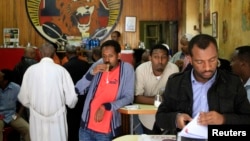ADDIS ABABA —
Experts say Africa's economy is expected to grow by 4.8 percent in 2013, and exceed five percent growth in 2014. Statistics compiled by the African Development Bank, the U.N. Development Population and the OECD Development Center indicate Libya will be the fastest growing African country, followed by Sierra Leone and Ivory Coast.
The African Economic Outlook report of the African Development Bank and its partners projects that Africa’s gross domestic product -- the measure of goods and services produced -- will grow by 5.3 percent in 2014.
Central and West Africa are the fastest growing regions, mainly because of their commodities.
Anthony Simpasa of the African Development Bank said the continent's economy is on the move but that challenges still remain. “We need to take into account some of the factors that could drop back this growth. Some of these factors are from the interventions: political, crisis, commodities prices falling in next few years if the current situation continues," he said. "But also there are some domestic conditions that countries need to take account of: good policy environment, and also judicial management on natural resources in order to force that structural transformation.”
Despite its 2011 revolution, Libya is the fastest growing economy as post-revolution stability resulted in a quick recovery.
Exports of commodities and agricultural products are among the drivers of Africa's growth. But the continent faces risks from falling commodity prices, lower earnings from tourism, political uncertainty and policy reform delays.
Eugene Owusu, resident representative of the UNDP, said it is also important for African countries to ensure that the people share the wealth to decrease poverty levels and increase development. “But going forward, given the magnitude of the challenge, the development challenge that this continent faces, it is absolutely important that Africa deepens its structural transformation. What is important is capable states, what is important is effective leadership and what is important is prudent governance at all levels,” he said.
The slowest growing African countries include fragile states such as Egypt and Equatorial Guinea. But South Africa is also on the list. Its main trade partner is the European Union and exports have declined because of the European economic crisis.
The African Economic Outlook report of the African Development Bank and its partners projects that Africa’s gross domestic product -- the measure of goods and services produced -- will grow by 5.3 percent in 2014.
Central and West Africa are the fastest growing regions, mainly because of their commodities.
Anthony Simpasa of the African Development Bank said the continent's economy is on the move but that challenges still remain. “We need to take into account some of the factors that could drop back this growth. Some of these factors are from the interventions: political, crisis, commodities prices falling in next few years if the current situation continues," he said. "But also there are some domestic conditions that countries need to take account of: good policy environment, and also judicial management on natural resources in order to force that structural transformation.”
Despite its 2011 revolution, Libya is the fastest growing economy as post-revolution stability resulted in a quick recovery.
Exports of commodities and agricultural products are among the drivers of Africa's growth. But the continent faces risks from falling commodity prices, lower earnings from tourism, political uncertainty and policy reform delays.
Eugene Owusu, resident representative of the UNDP, said it is also important for African countries to ensure that the people share the wealth to decrease poverty levels and increase development. “But going forward, given the magnitude of the challenge, the development challenge that this continent faces, it is absolutely important that Africa deepens its structural transformation. What is important is capable states, what is important is effective leadership and what is important is prudent governance at all levels,” he said.
The slowest growing African countries include fragile states such as Egypt and Equatorial Guinea. But South Africa is also on the list. Its main trade partner is the European Union and exports have declined because of the European economic crisis.





